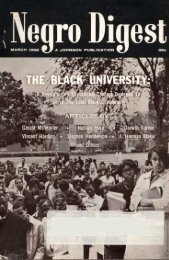3. Strain, Christopher Barry. “Civil Rights and ... - Freedom Archives
3. Strain, Christopher Barry. “Civil Rights and ... - Freedom Archives
3. Strain, Christopher Barry. “Civil Rights and ... - Freedom Archives
You also want an ePaper? Increase the reach of your titles
YUMPU automatically turns print PDFs into web optimized ePapers that Google loves.
those living within that system . Hate the evil deed, King would say, not the evildoer. Fourth,<br />
it requited "a willingness to accept suffering without rotaliation ." Unearned suffering was<br />
redemptive. Finally, nonviolence eradicated not only physical violence but "violence of the<br />
spirit" : it created peace <strong>and</strong> spread love .~ 3<br />
Additionally, certain universal truths informed King's protest . He believed that<br />
people, within their own destinies, are good <strong>and</strong> free. He believed that God is both<br />
"toughminded" <strong>and</strong> "tenderhearted" : a powerful but loving God . He believed that<br />
humankind fell from God's grace when Adam <strong>and</strong> Eve overstepped the bounds of their<br />
freedom, <strong>and</strong> that individuals continued to create problems for themselves when their actions<br />
impinged on the freedom of others . He believed that an imbalance ofjustice<br />
330ne can actually see the development of King's philosophy of nonviolence by<br />
reading his notations in the margins of his copy of William Stuart Nelson's article<br />
"Satyagraha : G<strong>and</strong>hian Principles of Non-Violent Non-Cooperation" ; see Box 82, Folder 58,<br />
Martin Luther King Collection, Department of Special Collections, Boston University. The<br />
marginalia reveals King's impressions while reading Nelson's article, published in the<br />
Autumn-Winter issue, 1957-58, of The Journal of Religiousous Th~ouah_t . Here King first jotted<br />
down his notions of the supremacy of truth, <strong>and</strong> of nonviolence as a way of life ; he also<br />
recorded how nonviolence avoids both external <strong>and</strong> internal violence, <strong>and</strong> how it<br />
distinguishes between evil <strong>and</strong> the evildoer. A more polished articulation of King's<br />
underst<strong>and</strong>ing of nonviolence may be found in Martin Luther King, "Pilgrimmage to<br />
Nonviolence," Stride Toward <strong>Freedom</strong> , particularly pages 102-104 . See also Allan Boesak,<br />
"Coming In Out of the Wilderness: A Comparative Interpretation of the Ethics of Martin<br />
Luther King, Jr. <strong>and</strong> Malcolm X," (Masters thesis, Kampden, Netherl<strong>and</strong>s : J.H . Kok, 1976),<br />
36, reprinted in David J . Gatmw, Martin Luther King . Jr . : Civil Ri¢hts Leader. Theolaai~ an r .<br />
Orator (Brooklyn, NY : Carlson Pub., 1989), 94 ; <strong>and</strong> James A . Colaiaco, "Martin Luther<br />
King, Jr., <strong>and</strong> the Paradox of Nonviolent Direct Action," pylon 47 (1986) : 18, reprinted in<br />
Garrow, Kind CivilRim, 191 . For more on vsar~a, see 8ondurant, Guest of<br />
Violence , 6.<br />
1 8
















